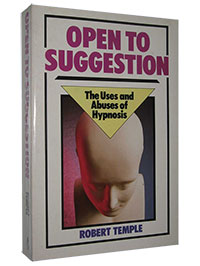|
Open to Suggestion: The Uses and
Abuses of Hypnosis
by
Robert Temple

Excerpt From Author Robert Temple:
The fact is that many
people in the field of hypnosis wish this issue would go away because it
gives hypnosis a bad name. As one friend said to me at a hypnosis conference
after realizing that in this book I intended to discuss the criminal abuses
of hypnosis: "I hope you won't go into that too much, because it will
frighten people off." They are justifiably worried that their field will be
shunned by the public, who will refuse hypnotic treatment for illnesses, and
grants for research will be refused, if the word gets around that hypnosis
can also be abused and be dangerous in the sense described in this chapter.
They are concerned that the public will react with hysteria. It was with
such concerns in mind that I purposefully preceded this chapter with the
chapter on the benefits and promise of hypnosis, stressing its invaluable
uses for the good, which must never be neglected. And I hope all readers
will realize that the point of writing about the criminal abuses of
hypnosis is to warn the public to avoid dangers which are largely avoidable
through being well informed. One cannot refrain from warning them of the
dangers of hypnosis just because one wants to be sure that they will enjoy
the benefits of hypnosis.
Nevertheless I did have
a crisis of conscience over this matter for many, many months. I worried
that evil people reading about this subject would think 'Oh, that's a good
idea. I must try that!' This sort of thing has happened before. We know that
Adolph Hitler intently studied Le Bon's book The Crowd (to be discussed in
Chapter 8), the first substantial study of crowd psychology and how to
manipulate the masses. Could some psychopathic criminal get hold of my book
and learn some new tricks? Wagner, Nietzsche and Le Bon did not mean to
contribute to the horrors of Nazi Germany, yet their work was exploited by
the monster Hitler. Would monsters exploit my work for evil purposes?
This is a risk which
must be taken. I discussed this dilemma with various friends and
acquaintances. I thought hard about it. I looked round for opinions on
similar matters in print I decided that ignorance by the public was a far
more dangerous risk than that a handful of criminal psychopaths might read
what I have to say. A determined psychopath
can always learn these things about hypnosis anyway, and I understand that
Charles Manson studied hypnosis and evidently used it in his revolting
crimes. I am one of those people who believe that the excessive violence in
today's films and television does cause increased violence on our streets
and in our society. I do believe in 'copy-cat' crimes modeled on films such
as Clockwork Orange. I do believe that the excessive and sickening sadism of
films such as those of the late Sam Peckinpah have made society more
dangerous. Therefore I am painfully aware of the terrible risk I am taking
in making known to a general public things about the criminal abuses of
hypnosis which have been safely locked away for decades in technical
journals.
I have decided that it
is more important that the public be informed. I am revealing these things
because I am convinced that only an informed public can guard against the
majority of possibilities of the criminal abuse of hypnosis. I am certain
that it is the widespread and mistaken conviction that abuses of hypnosis
are not possible that makes many of them possible. This is what I would like
to see remedied. I beseech the reader not to draw the wrong conclusions,
that because abuses are possible, hypnosis in itself is bad. It is not bad.
It is neutral. Its uses are good and its abuses are bad. Look at the words
of Baird quoted at the front of this book and remember that hypnosis is like
a scalpel: it can save lives and rid us of pain; the fact that a maniac can
use it for criminal purposes is not the scalpel's fault.
Professor George H.
Estabrooks took the same view as myself in the 1950s. Surveying the criminal
abuses of hypnosis, and the experiments of Rowland, Wells, Watkins, and
Erickson, in a 1955 article, he wrote:
"In human affairs there
is always a tendency to hope which turns into a belief that all will be
well. The past history of investigation of this matter of hypnosis and
antisocial conduct shows all too clearly this intellectual interpretation
based on wishful thinking rather than a facing of the facts. Inadequate
experimentation [referring to the experiments of Erickson] supports a
prayerful hope, the experimenter washes his hands of the whole dirty mess.
My own interest lies in
the military application of hypnotism and it is a dirty mess. The top social
rating we can apply to such investigation would be 'unethical,' but no
ostrich ever solved his problem by poking his head in the sand. We must face
and penetrate our tragic world rather than retreat into the comfortable
armchair of daydreams..."
In the preface of his
book Hypnotism in 1959, Estabrooks wrote: 'The intelligent reader of Chapter
9, "Hypnotism in Warfare," will sense that much more is withheld than has
been told, but as much has been revealed as is compatible with public
interest.
Estabrooks was convinced
that criminal acts could be committed under hypnotic influence, and that
people could be hypnotized against their will, with all memory being erased
that they had ever been hypnotized. He carried out a number of experiments
to demonstrate his points, which he recounted in his book.
-Author, Robert Temple
|